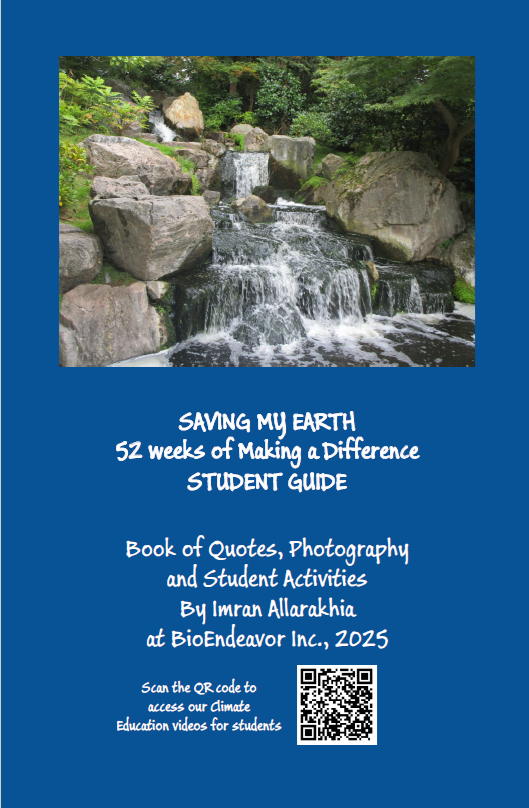Climate Education Series: Climate Justice-Protecting the Vulnerable
- Dr. Minna Allarakhia

- Dec 23, 2023
- 4 min read
Updated: Dec 28, 2023
Climate Education for Students Assignment 5:
In this module, you will learn about the crisis facing developing nations, when it comes to climate change. We often talk about equity, justice, inclusion, and human rights. What does climate change have to do with these issues? This is where climate justice becomes important. According to Yale Climate Connections, “Climate justice” is a term, and more than that a movement, that acknowledges climate change can have differing social, economic, public health, and other adverse impacts, on underprivileged populations." Climate change is likely to widen the social, economic, and health divide, that already exists in our societies. It is important then to understand the issues, before we can find the needed solutions.
The Impact of Climate Change: Understanding Climate Justice
Climate change is impacting the entire world. We increasingly see forest fires, flooding, extended and dangerous heat waves across the world, see images of smog filled cities, have experienced the emergence of once isolated diseases, read and see the constant images of waste, including in our oceans. The question is, how will the impact of climate change differ across countries and regions? The United Nations describes that “The impacts of climate change, will not be borne equally or fairly, between rich and poor, women and men, and older and younger generations.”
Carbon Emissions Carbon emissions vary across the world, depending on a country's activities. According to UN Secretary-General António Guterres, “And, as is always the case, the poor and vulnerable are the first to suffer and the worst hit.” According to Yale Climate Connections, many of the victims of climate change are generally not responsible for causing the carbon emissions, that are driving climate change. Youth and people from developing countries, produce fewer emissions per capita than in major polluting, more developed countries.
The Vulnerable Low-income communities, people of color, indigenous people, those who are disabled, older or very young people, and certainly women, are likely to be impacted severely from wildfires, storms and flooding, pollution, heatwaves, droughts that then limit access to food and water, and cause city level changes. They will need support in terms of finding new shelter or equipping their homes from the impacts of climate change, to learn how pollution and heatwaves can impact their health, in terms of food and water security, and new job training as the world's economies change.
Working Together We all live on one world. We need to work together to address the challenges from climate change. And we need to pay close attention, to all those who are particularly vulnerable, to the devastating impacts from climate change. This could become a matter of life or death for these people.
The right to shelter, food, health and education, are rights that we all should enjoy. We need to ask, that with our constant development, continued production, and consumption, how are we impacting the world not only for ourselves, but also how much more difficult are we creating conditions for those who don't have access to good shelter, food security, to healthcare, or even education.
It is happening across the world. Our continued development and need for goods, without thinking about the future consequences, is resulting in deforestation, and even the displacement of people and animals, as well as the loss of our biodiversity. As our population grows, we will need more land to grow food to feed the world's population. It is only through thoughtful, well-planned development, that we can grow together, whilst protecting our planet.
Achieving the Sustainable Development Goals By learning about the 17 sustainable development goals, we can build better, build for inclusion, equity, and security. Climate change is likely to make it difficult for us to achieve these sustainable development goals. Climate action and advocating for the more vulnerable, is vital to making progress on these goals; else we will only create more poverty, more hunger, and more disease. The time for action is now, and the first step is to learn about all of the larger impacts of climate change across the world; not just our own country.
Climate Refugees
The UNHCR or the United Nations High Commissioner on Refugees, has said that, "roughly 90 per cent of refugees come from countries that are the most vulnerable and least ready to adapt to the impacts of climate change. From Afghanistan to Central America, droughts, flooding, and other extreme weather events, are hitting those least equipped to recover and adapt”, said the UN agency, which is asking for countries to work together to address climate change and and its impact on hundreds of millions of vulnerable people. Resource: Data reveals impacts of climate emergency on displacement
In this assignment, students will select varied countries to analyze the:
• Short term impact, and risk from climate change.
• Long term impact, and risk from climate change.
• Current adaptation strategies, and policy development.
• Suggested adaptation strategies, and policy development.
• The need for climate justice in policy development.
Select countries that are familiar to or places of origin, for a variety of teachers in the school. Students will role play with these teachers, acting as consultants, advising their teachers who will act as government officials, on the risks and needed strategies or policies. Have students and invited teachers engage in a meaningful dialogue.

Comments